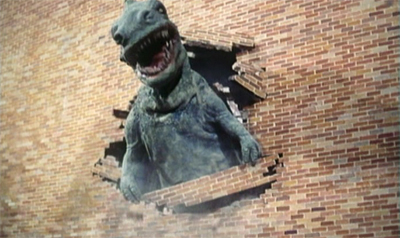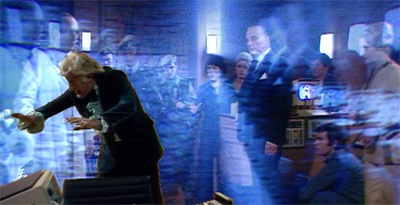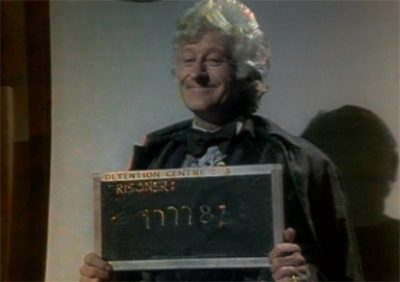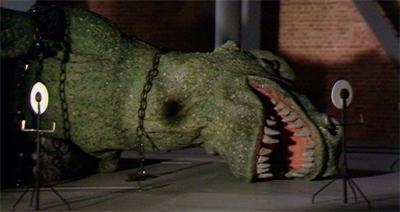To celebrate the fiftieth anniversary of the longest-running science-fiction show in the world, I’ll be taking weekly looks at some of my own personal favourite stories and arcs, from the old and new series, with a view to encapsulating the sublime, the clever and the fiendishly odd of the BBC’s Doctor Who.
Invasion of the Dinosaurs originally aired in 1974.
How are you feeling now?
Hungry, tired and I’ve got a headache.
– Mark asks Sarah Jane how her viewing went. I can empathise.
Ah, ambition. It’s hard to fault it… although there is a point where you simply have to. Invasion of the Dinosaurs crosses that line in the first episode. I know that Doctor Who is a BBC television serial. I understand that the classic series hardly had a huge amount of money to hand when it needed special effects. I am well aware that the special effects for the following season’s The Ark in Space amount to some bubblewrap and green paint. There is an art to watching many of these classic stories, and that art involves being wilfully blind to the fact that the special effects aren’t up to scratch. Beyond that, it’s arbitrary. There’ll always be one silly special effect that undermines an otherwise impressive episode – which special effect and which episode will vary from person to person.
However, Invasion of the Dinosaurs makes the special effects the whole point of the exercise. The title tells you that you should be watching the dinosaurs. Malcolm Hulke was given the brief to write a story about dinosaurs in contemporary London. There might be a plot underneath it all, but the serial expects that you are here for the dinosaurs. And, if you are…
I’m sorry. I’m so sorry.
Even producer Barry Letts will concede that things didn’t go quite as planned. He has admitted that the giant dinosaur suits are indistinguishable from puppets:
Visual effects saw in the script for Invasion of the Dinosaurs the requirement for a twenty foot monster which they then made in the customary way. They produced a man-sized dinosaur suit which was so heavy when worn that in order to support the weight of it, the head had a ring bolt through it, fixed to a line attached to the ceiling. Therefore the actor inside could only move within the narrow radius allowed by the length of the line. After that, they used CSO (Colour Separation Overlay) to make the creature seem large beside Jon Pertwee, and it wasn’t until a while afterwards that it dawned on everyone that there was no need to have gone to all the time and expensive of building a full-sized suit. They could have achieved exactly the same effect using a puppet two feet tall, operated by rods.
That’s hardly the best that anybody could have hoped for, and I think that’s what’s really frustrating about this. It’s not that the effects are terrible (though at times they are), it is that so much effort went into the effects that ended up terrible.
Apparently Barry Letts even hinted at one point that he’d like to see the Restoration Team “tweak” Invasion of the Dinosaurs with the same CGI that they used on other DVD releases. Of course, that was never going to happen. The budget for each release is set, and Invasion of the Dinosaurs was already a troublesome release on its own terms. The first episode was only available in black & white, forcing the team to recolour it without the chroma key. The results are quite impressive, to be honest, even if there is a marked difference in the quality of the first and second episodes.
Even if Invasion of the Dinosaurs didn’t require this special restoration work, there’s a world of difference between animating CGI dinosaurs and even the most dramatic of the Restoration Team’s special effects work – which for my money, was at the climax of Day of the Daleks. Interestingly, the first episode – available on the DVD in black & white and colour – actually suggests that the dinosaurs look much better in black & white. They don’t look more convincing, but the effects evoke an affectionate British homage to Godzilla when rendered in monotone.
So, Invasion of the Dinosaurs does not look good. It isn’t just a single ill-advised effect or a single poorly-conceived monster. It’s the root of the serial. Invasion of the Dinosaurs might be driven by a conspiracy theory plot, but there’s a sense that the show is built around the dinosaurs. At the very least, if you removed the dinosaurs, we’d still be looking at a ridiculously padded four-episode serial. (Instead of a ridiculously padded six-episode serial.)
The plot of Invasion of the Dinosaurs is about a secret plan to turn back the clock in London. It’s actually an interesting idea, one of those times in the Pertwee era when the show seemed to actually grasp the possibilities inherent in time travel. A bunch of crazy people plan to turn back time to the prehistoric age and begin civilisation on Earth from scratch. It’s not the strongest basis for a six-part story, but there is at least the gem of a good idea to be found here.
The script is from the reliable Malcolm Hulke, who has contributed some of the most philosophical and political scripts to the Jon Pertwee era of the show. He has, interestingly enough, identified Invasion of the Dinosaurs as his favourite script:
I decide what I wanted to do, and came up with a lovely idea of The Golden Age with all these people behind it who just didn’t fit in. There were lots of rather sad people always living in the past, and who wanted to turn back the clock. I think they were totally wrong in their thinking, but I liked the story – it’s easily my favourite – because I felt that it was the way a lot of people feel, left out of left behind by things changing.
I can’t help but feel that Hulke was doing something just a little bit subversive with Invasion of the Dinosaurs, perhaps even criticising the show itself just a little bit.
It is worth noting that Invasion of the Dinosaurs doesn’t really work as a script. It requires us to believe, for example, that Mike Yates doesn’t care about his friends existing. There’s a moment where Benton asks him about the fact that he won’t exist if this plan works, and he remarks that he considers it worth the sacrifice. What little we know and have seen of Yates as a person, though, it seems that he would have a problem with wiping out everybody he works with.
Of course, this is a broader problem with the U.N.I.T. era. With a larger cast than usual, the show didn’t really define the characters too well. What little we know of Benton and Yates, for example, is intuited rather than explicitly stated. Yates betrayal here doesn’t sting in the way that a sharp reversal really should – we don’t feel betrayed in the same way that the Brigadier or Benton do. Instead, it stands out because it comes so out of left-field and is so obviously evil.
To put it another way, we don’t know enough about Yates personally to think this betrayal is out-of-character for him. There’s nothing to support it in what we know of him, but there’s nothing to rule out. However, he’s been treated as a bland and generic character, and we know enough about the plan to know to know that no right-thinking individual could possibly go along with it, so it seems wrong that this bland character should suddenly have so bizarre and contrary a conviction.
There’s nothing we’ve seen in his character that would make it impossible, but with a plan this crazy the onus is on the show to make his new ideals at least reasonably convincing. The excuses given (“the world used to be a cleaner, simpler place – it’s all become too complicated and corrupt”) simply don’t cut it. This is perhaps the limit of the Pertwee era. The show simply didn’t do character development well enough to support a cast this large.
However, Yates betrayal might not work from a character point of view, but it does something important. It stabs at the heart of the U.N.I.T. era, effectively ending this period of the show. Pertwee’s last season has a bit of a funereal atmosphere to it, even though he hadn’t firmly decided he was leaving yet. It’s not as strong as the “entropy” theme in Tom Baker’s final year, or even the nihilistic subtext in Peter Davison’s last season, but it’s there. Yates effectively breaking up the family is an important step in that direction.
Indeed, Invasion of the Dinosaurs hinges on the limits of the relationship between the Brigadier and the Doctor. Despite the fact they’ve been working together for almost half a decade, the Brigadier can be turned against the Doctor remarkably easily. Even when it’s clear he doesn’t believe the accusations against his colleague, there are limits to what the Brigadier can do. “Doctor, I can get away with holding you here, keeping you out of General Finch’s hands, but what you’re suggesting is mutiny.”
Hulke seems to be reinstating something that was clear at the start of the Pertwee era, but got lost as the Doctor got closer and closer to the Brigadier: the Doctor and U.N.I.T. aren’t really a happy family, they are a marriage of convenience. Their ways of perceiving the universe are radically different, and perhaps the show has lost sight of that in pursuing the idea of an enjoyable romantic fantasy about a mad man in a box.
Pertwee looks tired, and noticeably older. Far from the dynamic hero who appeared four years ago, he gets beaten up by two looters in the first episode. In fact, in keeping with Hulke’s erosion of the relationship between the Doctor and the Brigadier, the Doctor seems especially frustrated with the Brigadier’s refusal to believe him about the secret base in the fourth part, which seems somewhat arbitrary when there are dinosaurs around London.
Interestingly – and probably incidentally – Invasion of the Dinosaurs marks the second time this season that Pertwee is referred to as a “wizard.” I doubt it was a conscious decision from Barry Letts, but it does play into the pseudo-mysticism that surrounds the character’s regeneration in Planet of the Spiders. It’s not really that important, but I thought it was interesting to note.
However, more to the point, and perhaps more firmly foreshadowing things to come, we get to see U.N.I.T. facing with a crisis without the Doctor around. The Brigadier is remarkably accusatory when the Doctor returns. “It all started just after you, Doctor and – as we later discovered – Miss Smith went off on your last little jaunt.” The use of the word “jaunt” seems a little ‘loaded’, and is another example of Hulke playing up frictions that have really been allowed to mellow in the past few years.
Finch is even more demanding when he greets the Doctor. “Oh. We’ve been waiting for you, you know. May I ask where you’ve been?” Of course, the Third Doctor bristles at the assumption that he has to account for his whereabouts. Still, Hulke seems to be wondering what role U.N.I.T. has in the series now that the Doctor is free to travel in space and time. Invasion of the Dinosaurs seems a little bit uncomfortable with just how establishment the Doctor has become, pointing out that Doctor, by his nature, isn’t suited to that approach.
I can’t help but feel Hulke is criticising the show a bit here. It’s worth remarking that Pertwee era began with a decidedly more grounded version of the character, dealing with very material and important themes. The serials in Jon Pertwee’s first year – including Hulke’s superb Silurians – were generally built around a more thoughtful vein of science-fiction. Gradually, the show leaned back towards action and adventure. Barry Letts really codified it with Terror of the Autons in Pertwee’s second season, and the show has been moving further and further into the realm of the fantastic since the Doctor got his TARDIS back in The Three Doctors.
There’s nothing wrong with embracing the fantastic as a concept. Indeed, Tom Baker would spend most of his time dealing with the fantastic, disconnected completely from modern-day Earth. It’s a perfectly valid way to tell a Doctor Who story. In fact, I’d argue that there’s no single “right” way to tell a Doctor Who story, and that this is part of the appeal of the series. Even if you accept that Invasion of the Dinosaurs is a criticism of the tail-end Pertwee era, that doesn’t mean you have to agree with it.
That said, it’s not too difficult to imagine Hulke looking at the Pertwee era and feeling a bit betrayed, as if the show has drifted away from the promise established in that rocky first year. Again, this isn’t necessarily entirely fair. The Green Death, for example, was very socially conscious, if clumsily so. But – broadly speaking – the last three years have seen the show move more firmly towards embracing the fantastic and disconnecting a bit from complex moral and philosophical issues.
I’ve talked a great deal about how Barry Letts and Jon Pertwee turned the Doctor into an establishment hero, but this seems to be about something more fundamental than that. In a short scene, early on, U.N.I.T. finds itself dealing with looters in Central London. It’s a scene that is probably more powerful in 2013 than in1974. Before we’re told what has happened, the show informs us that U.N.I.T. has declared martial law in the city.
You can spot the traitors in this early scene as the members of U.N.I.T. who are primarily concerned with dealing with the looters. “We’re going to need more detention centres,” the treacherous Yates notes. The sinister Finch informs the Brigadier, “You can have your extra patrols, Brigadier, but my instructions to them are that any looter who does not surrender immediately will be shot.” Even if that line establishes Finch as a baddie, the Brigadier still works for an organisation following those orders.
The villains of the piece are reactionary. They are responding to crime and urban decay with no real attention to the wider context. The Brigadier even tries to point this out to Yates. “It’s more important to find the cause of this crisis than to deal with its effects,” he argues. It’s clear that the real heroes of the piece are more interested in the root cause of the problem. When the Brigadier claims that U.N.I.T. has looting under control, the Doctor isn’t satisfied. “Well, that’s absolutely marvellous, Brigadier. Now what’re you doing about the real problem?”
This makes sense. After all, why are people rioting? What is the reason for this action? This sort of crime is, sociologists tell us, but a symptom of a greater social ill. The Brigadier and the Doctor are interested in that question. At this point, it seems like a typical Malcolm Hulke script. We’re going to use science-fiction to explore questions of social values and moral philosophy. However, the story then takes a bit of a sharp left-turn. The root cause, we’re told, is dinosaurs. People are looting because of dinosaurs.
To be clear, people are not looting because of social injustice. People are not looting because of improper government. People are not looting because the system is decaying from the inside out. People are not robbing to feed their families. In the world of this new Doctor Who, Hulke seems to suggest, the root of all social strife can be traced back to the marauding monsters that show up and roam the city streets. Hulke teases us with the idea of socially conscious Doctor Who, and then has our characters blame all the social ills on the wandering dinosaurs.
Of course, the dinosaurs can’t really be blamed. They are just innocent reptiles that were plucked out of their own time and acting according to their nature. The real villain of the piece turns out to be Grover, a sinister government minister who wants to re-write history. Invasion of the Dinosaurs touches time and again on the importance of notation and writing. In this case, the Golden Age people want to literally re-write history by turning back the clock. “Soon the Doctor and his associates and everyone on this planet, except our chosen group, will never have existed,” he boasts.
However, he is also shown to re-write history in a more insidious way. Grover is able, in his position as a minister, to secret away plans for underground bunkers. He can make it so they never existed to the outside world, allowing the Golden Age to hide away inside them. By virtue of his authority, he has the ability to quite simply declare that they never existed. He can already re-write history. It’s also no coincidence that one of those members of the Golden Age exploited by Grover is “Nigel Castle, the novelist.” Indeed, it’s Castle who really begins to question the story he has been told when Sarah Jane freaks out.
It would seem, Hulke suggests, that writers have a duty to their audience. It’s no coincidence that the Golden Age are kept under control with stories about space travel and distant planets while Grover goes about his sinister business unquestioned. Hulke seems to be arguing that writers owe it to the audience not to get swept away in fantasy and romance, and instead engage with politics and reality. You could make an argument that Hulke composed Invasion of the Dinosaurs as a condemnation of the way that the Pertwee era drifted away from its grounded examination of human drama into colourful space fantasies.
That would explain, then, why so much of Invasion of the Dinosaurs feels so damn cynical, despite being a fairly generic Pertwee run-around. Hulke is offering us his own disillusioned version of what he feels the show has become – a collection of set-pieces and special effects disengaged from reality. So we get the typical padded Pertwee chase sequence. We also get the gimmicky nonsense of the “Whomobile”, which didn’t even appear in Hulke’s script, but so perfectly embodies what he seems to be rallying against.
Indeed, the climax of the story can’t help but feel incredibly sarcastic, as Hulke forces the Doctor to argue about social responsibility in the most half-hearted fashion imaginable. “Take the world that you’ve got and try and make something of it,” the Doctor pleads. “It’s not too late.” That’s the sort of moral that we expect from Hulke’s stories, but it’s one that has become rarer and rarer as the Jon Pertwee era went on. The Third Doctor was spending less-and-less time on Earth, so it seemed the show couldn’t care less about making the world a better place.
The most cynical moment comes at the end of the episode, when the Doctor handily sums up a moral that nobody really asked for, and really has little to do with the story being told. “It’s not the the oil and the filth and the poisonous chemicals that are the real cause of pollution, Brigadier. It’s simply greed.” That’s all well and good, but Invasion of the Dinosaurs had nothing to do with greed. And the Doctor’s moral pronouncement is met with complete disinterest from those around him. “Well, I’ve got work to do,” the Brigadier responds. Ah, don’t worry though, the Third Doctor will be hoping back in the TARDIS to get away from the real world soon enough.
So Invasion of the Dinosaurs feels like the end of an era, perhaps the last gasp of U.N.I.T. as a concept. Pertwee’s final year feels like something of a victory lap, revisiting familiar concepts for one last time before it’s time to go. In the case of Invasion of the Dinosaurs, it is a less than fond farewell.
You might be interested in our reviews of the eleventh season of the classic television show:
- The Time Warrior
- Invasion of the Dinosaurs
- Death to the Daleks
- The Monster of Peladon
- Planet of the Spiders
Filed under: Television | Tagged: Ark in Space, art, Barry Letts, bbc, Brigadier, Chromakey, Dalek, Dinosaur, doctor, DoctorWho, Finch, Invasion of the Dinosaur, Jon Pertwee, London, Malcolm Hulke, Mike Yates, Online Writing, Sarah Jane Smith, science fiction, Special effect, tardis |





































Leave a comment